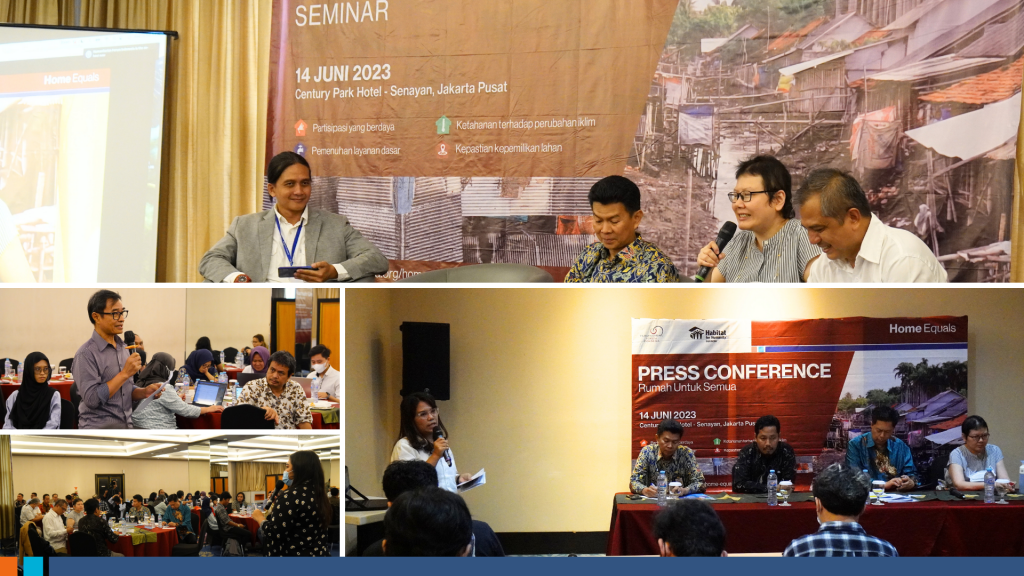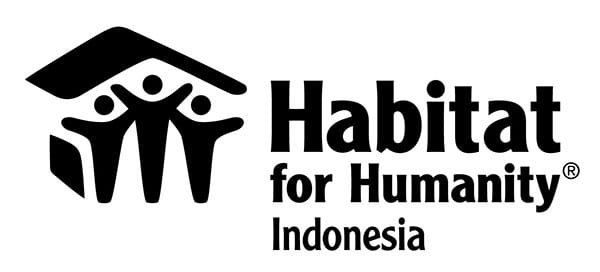Home Equals Campaign Launching through “Rumah untuk Semua” Seminar
Informal settlements continue to exist in various parts of Indonesia. According to UN-Habitat (2015), an informal settlement refers to an area of human habitation where residents lack legal ownership tenure, experience inadequate environmental quality, have limited access to basic services and infrastructure, and reside in geographically or environmentally hazardous locations.
Susanto, the National Director of Habitat for Humanity Indonesia, stated that both government and non-governmental organizations have implemented various housing programs. However, he pointed out that the majority of these programs tend to focus on individuals from low-income backgrounds and may not specifically address the issue of land ownership.
“Informal settlements, including slums, riverbanks, railroad tracks, and illegally occupied government or private land, have not been effectively reached by these programs,” Susanto stated during the “Rumah untuk Semua” campaign and seminar held in Jakarta on Wednesday, June 14th, 2023.
The “Rumah untuk Semua” (Home Equals) campaign was initiated by Habitat for Humanity Indonesia as the start of an ongoing discussion during the Housing Forum Seminar held in August 2023. The objective of this campaign is to advocate for equal access to decent housing for all individuals by advocating for changes in regulations and systems. The campaign focuses on several key aspects to address the housing issue.

The campaign emphasizes the need for regulations and systems that prioritize empowered participation, reliable and continuous basic services, climate change resilience, and land tenure security. The aim is to amplify the voices of those living in informal settlements and advocate for regulations that guarantee land tenure security. Through this campaign, Habitat for Humanity Indonesia strives to create a platform for dialogue and action that will bring about positive changes in the housing sector.
“Securing land tenancy through ownership rights can help individuals living in extreme poverty gain access to financing institutions, secure basic rights such as clean water and decent sanitation, establish legal rights over their land, and enhance their resilience to climate change,” emphasized Susanto.
Ms. Tri Dewi Virgiyanti, Director of the Ministry of National Development Planning/Bappenas, highlighted that housing and settlements are crucial components of basic infrastructure services and play a significant role in realizing the vision of Golden Indonesia by 2045. In pursuit of this vision, both the central government and local governments have implemented several ongoing programs to address informal slums in different cities across Indonesia. These initiatives serve as pilot projects aimed at organizing and improving living conditions in areas such as Pemalang Regency, Langsa City, and Gresik Regency.
During the event, numerous good practices were showcased. Residents who previously lived in informal settlements now have the opportunity to reside in housing areas or decent settlements, provided with essential infrastructure such as water, sanitation, and waste management systems, and land tenure security. This movement could potentially improve their livelihoods, addressing social, economic, and health challenges that they previously faced.
“Efforts will be made to draft the RPJPN 2025-2045 (National Medium-Term Development Plan) for the housing sector and participatory settlements. In implementing this plan, the role of organizations, civilians, and non-governmental organizations is crucial. The strategy for constructing housing and settlements will be based on five pillars, which include community readiness, organization, regulations, funding, and infrastructure registration.” Stated Ms. Tri Dewi Virgiyanti.
Edward Abdurrahman, the System and Strategy Director of the Ministry of Public Works and Housing, stated that the housing system and strategy encompass various aspects, one of which is self-subsistent housing that includes addressing informal settlements.
“Through this discussion, we aim to provide valuable input that can be formulated and utilized in the execution of formal settlements. This includes the provision of technical assistance, ongoing observation, and evaluation, such as to ensure the availability of settlements facilities and the effective management of decent housing,” expressed Mr. Edward.
Elisa Sutanudjaja, the Director of Rujak Center for Urban Studies (RCUS), presented a study conducted by RCUS that highlighted the challenges faced by small settlements within cities, such as Kampung Marlina in North Jakarta and Kampung Akuarium. She emphasized the importance of advocacy in addressing these issues, citing the collaboration between RCUS and the Gotong Royong Housing Coalition as an example. “We need a communal planning tools that allow residents of housing clusters in cities to not only participating in planning the structure, but also fostering a democratic and high-quality planning and neighborhood life,” she stated.

